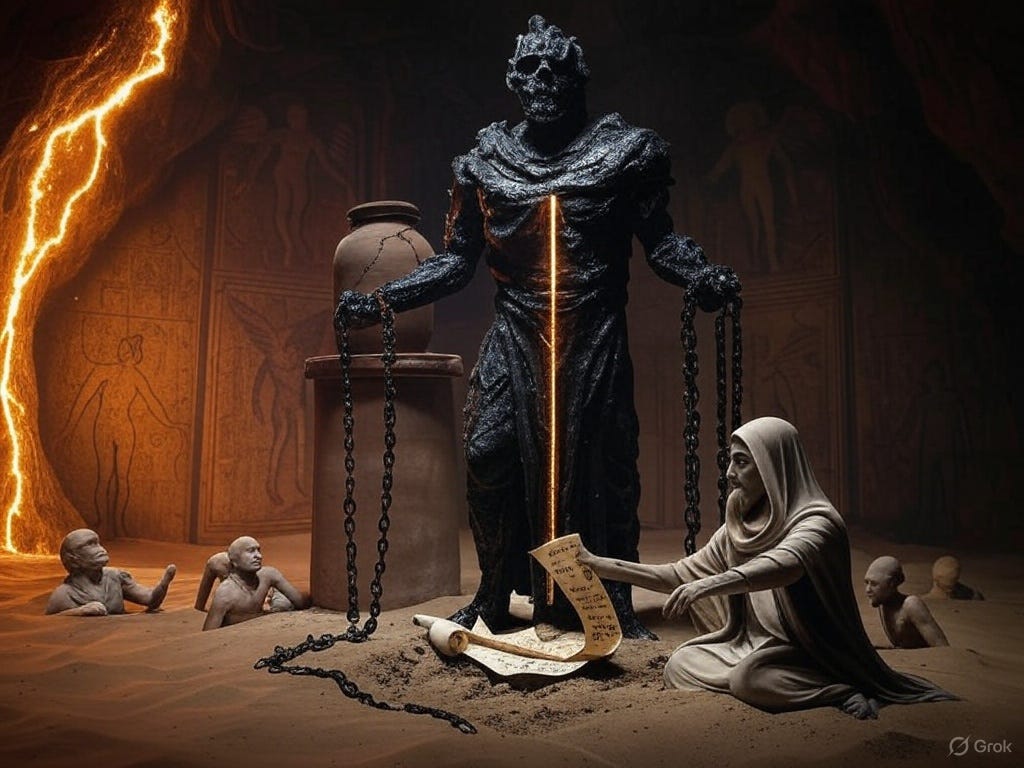The Daily Heretic: The Demiurge and Cosmic Dualism (2|5)
The God Who Was Not God
A Surprising Revelation
Imagine discovering your favorite hero was actually the villain. That’s what the Gnostics did to God—or, at least, to the God everyone thought they knew. At the heart of their heresy lay a shocking revelation: the Creator of the Old Testament, the God who parted seas and etched commandments into stone, was an impostor. Not divine, but deluded. Not omnipotent, but incompetent.
Meet the Demiurge—Gnosticism’s answer to history’s greatest lie.
The Flawed Architect
The word “Demiurge” (from Greek dēmiourgos, “craftsman”) comes from Plato’s Timaeus, where it describes a divine artisan shaping the physical world. The Gnostics twisted this into a theological horror story.
To them, the Demiurge was a lesser, ignorant deity who cobbled together the universe from spiritual scraps. Blind to the true God’s transcendent realm (Pleroma), he arrogantly declared, “I am God, and there is no other!” (Isaiah 45:5–6, repurposed as a Demiurgic boast).
This was no abstract critique. By equating the Demiurge with Yahweh, Gnostics turned Genesis into a calamity:
Creation as a Cosmic Accident: The material world was not “very good” (Genesis 1:31) but a botched imitation of divine light.
Humanity’s Divine Spark: Humans carried fragments of the Pleroma’s true God, making them prisoners of a tyrant’s delusion.
Salvation as Jailbreak: Escape required gnosis—awakening to the truth of one’s divine origin.
The Apocryphon of John, a key Gnostic text, dramatizes this myth: Sophia (Wisdom), a divine emanation, births the Demiurge without her celestial partner’s consent. Ashamed of her mistake, she hides him in a cloud, where he grows up ignorant and spiteful, fashioning a world of suffering to trap her light.
Why This Terrified Everyone
To the Church: Gnostic dualism wasn’t just heresy—it was existential sabotage. If the Old Testament God was evil, then Christianity’s claim to fulfill Jewish prophecy collapsed. Irenaeus of Lyons raged: “They call Him a liar, a fool, and a blind god! How can they trust Christ if they slander His Father?”
To Rome: Gnosticism’s rejection of the material world struck at imperial ideology. If the physical realm was corrupt, then Rome’s glory—its temples, laws, and wars—was a hollow pantomime. Worse, Gnostics often refused military service, taxes, and public rituals, branding them complicity in the Demiurge’s “prison.”
The Aeons: Cosmic Aliens Before Their Time
The Pleroma wasn’t empty. It teemed with aeons—divine beings embodying virtues like Truth, Life, and Silence. These weren’t angels but abstract emanations, layered in male-female pairs like metaphysical Russian dolls. Think of them as the ancient aliens of the spiritual realm: hyper-advanced entities guiding humanity toward enlightenment.
“From the depths of Light, we pour forth the mysteries.
The keys to the prison are hidden within.”
For Gnostics, Jesus was the ultimate aeon—an emissary from the Pleroma sent to hack the Demiurge’s system. His crucifixion? A staged exit, meant to outwit the archons (the Demiurge’s minions) who couldn’t perceive his true, spiritual nature.
Three Ways to Annoy Romans (Theological Edition)
Redefine “Sacrilege”: Call Jupiter and Mars “archontic puppets” in your underground newsletter.
Undermine Military Glory: Teach that soldiers who die for Rome are “doubly enslaved—to flesh and to folly.”
Rewrite Scripture: Distribute the Gospel of Truth (attributed to Valentinus), which claims the Demiurge “stole the divine light like a thief in the night.”
Orthodoxy Fights Back
The Church’s response was both tactical and existential. Irenaeus of Lyons, in his Against Heresies (c. 180 AD), launched a systematic campaign to dismantle Gnosticism’s intellectual credibility:
“A God of Scraps and Shadows”: He derided the Demiurge as a “patchwork deity,” stitching together Platonic myths and pagan superstitions. To Irenaeus, this was not theology but “the babbling of those who mistake their dreams for divine truth.”
Elitism as Heresy: He attacked Gnosticism’s exclusivity, arguing that salvation reserved for the “spiritually elect” contradicted Christ’s universal message. “If the Logos became flesh for all,” he wrote, “why must only a few grasp secret passwords to heaven?”
The Body Paradox: Irenaeus weaponized Gnosticism’s own dualism: If matter were irredeemably corrupt, why would Christ take human form? “By their logic, the Cross is a farce,” he declared, “and the Resurrection a lie.”
Beneath the rhetoric lay genuine terror. Gnosticism’s promise of unmediated access to the divine threatened to unravel the Church’s authority—and with it, the fragile unity of a faith still defining itself.
Legacy of a Heresy
The Demiurge did not stay buried. Across centuries, Gnosticism’s DNA resurfaced in movements that similarly defied institutional power:
The Cathars (12th–14th century): These medieval dualists, branded as heretics, revived Gnostic themes, declaring the Catholic Church the “synagogue of Satan” and the material world a trap. Their extermination during the Albigensian Crusade mirrored antiquity’s heresy hunts.
Philip K. Dick’s VALIS (1981): The sci-fi author reimagined Gnosticism as a psychedelic info-war, with God as a cosmic satellite hacking humanity’s “Black Iron Prison” of delusion—a metaphor for modern alienation.
The Digital Age’s Hidden Truths: Contemporary conspiracy culture, with its obsession with “awakening” and shadowy elites, mirrors Gnosticism’s spiritualized suspicion of power. While QAnon’s “red-pilling” trivializes gnosis, it channels the same hunger to unmask a world perceived as false.
Scholar David Brakke notes: “Gnosticism is less a heresy than a recurring mood—one that distrusts all claims to final authority.”
Tomorrow’s Revelation: The Nag Hammadi Library
The Church burned their texts. The Empire scattered their followers. But in 1945, a clay jar in Egypt cracked open, and the Gnostics’ voice roared back to life.
Tomorrow, we explore Christianity’s deleted scenes—the gospels Rome tried to erase.
🔥 Stay curious. Stay heretical 🔥
This is 2 of 5 in a series on the Gnostics - Series here: The Daily Heretic
Share with your friends so you can relive the excitement together!




